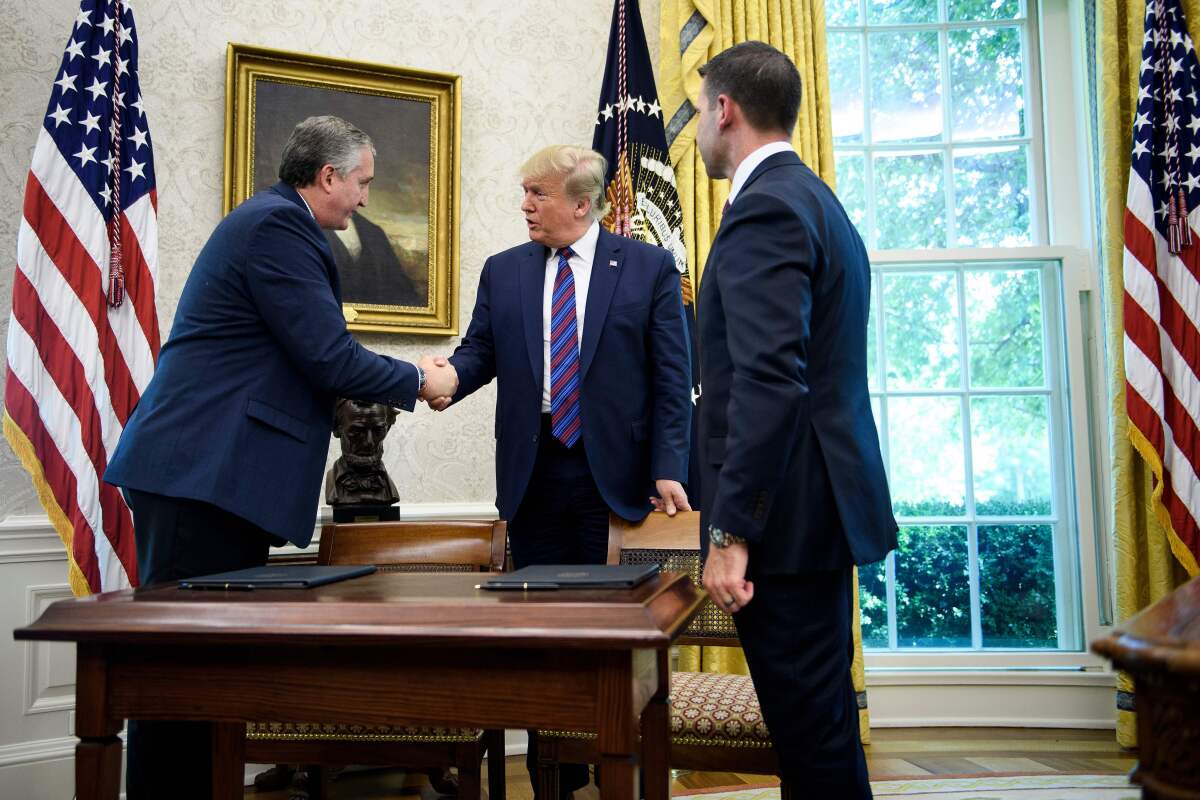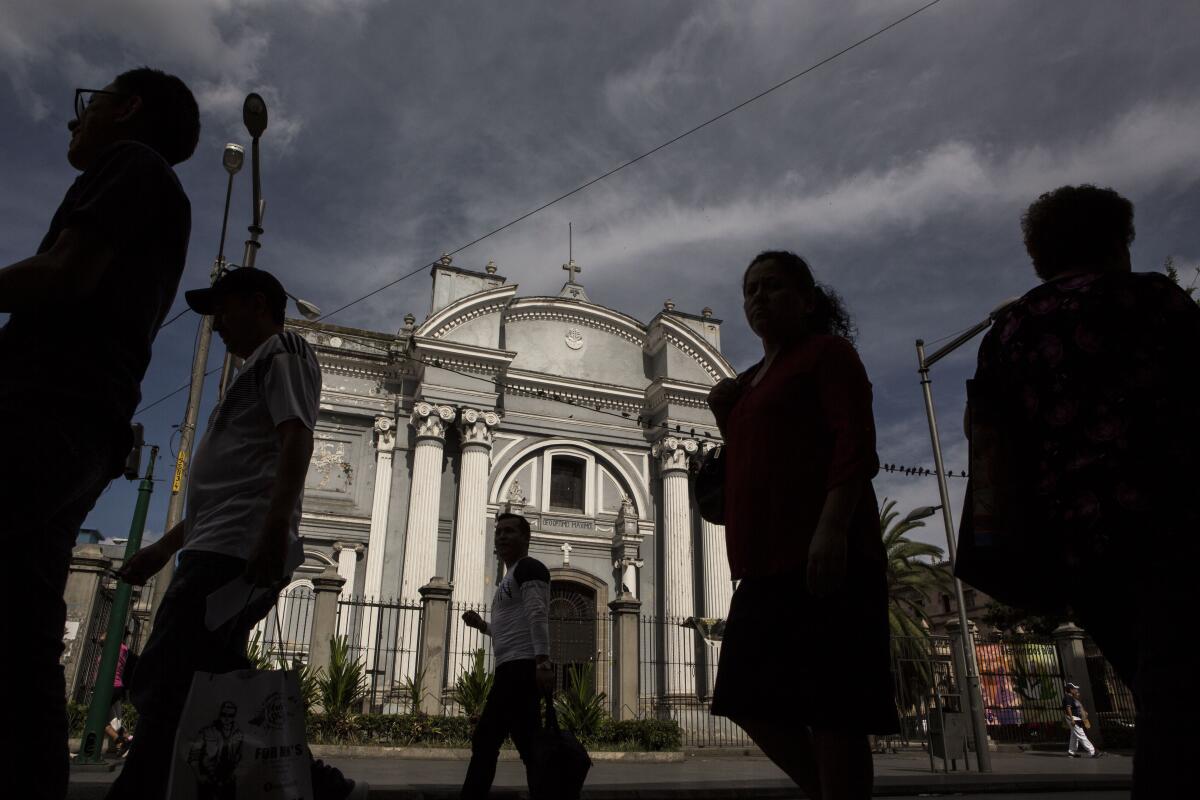Trump administration, Guatemala sign pact barring migrants from claiming asylum in U.S.

- Share via
WASHINGTON — Guatemala has signed an agreement with the Trump administration that would require asylum seekers transiting the Central American country to make their claim there instead of in the U.S., President Trump said Friday.
“We have long been working with Guatemala, and now we can do it the right way,” Trump said in the Oval Office. “This landmark agreement will put the coyotes and smugglers out of business,” he continued. “These are bad people.”
Trump looked on as acting Homeland Security Secretary Kevin McAleenan signed the document alongside Guatemalan Interior Minister Enrique Degenhart. In a statement released on Twitter, the Guatemalan government confirmed it had entered into an agreement.
Neither government released details, leaving major questions unanswered about how the deal would be carried out. Guatemala’s highest court previously ruled that the country’s president could not sign such an agreement.
“Guatemala is definitely clear on the responsibility that it has,” said Degenhart when asked about the court decision.
McAleenan told reporters after leaving the White House that steps needed to be taken in Guatemala to authorize the deal, but that he expected that it would be in effect in August.
The agreement may also face legal challenges in the U.S. Immigrant advocates say Guatemala cannot be considered safe and has no adequate means to process tens of thousands of asylum applications.

The Guatemalan government said the agreement would specifically apply to Hondurans and Salvadorans, who typically travel through Guatemala en route to Mexico and the U.S. Under the agreement, they would have to seek asylum in Guatemala and could not claim asylum in the United States unless they were denied refuge there. If they arrive at the U.S. border, they would be returned to Guatemala, McAleenan said.
Hondurans currently account for about 30% of all those apprehended at the U.S. southern border — about 205,000 people in the current fiscal year — while Salvadorans make up about 10%.
“A Honduran family coming across through Guatemala to the U.S. border, we want them to feel safe to claim protection at the earliest possible point,” McAleenan said. “Instead of putting themselves in the hands of smugglers all the way to the U.S. border, they would be removable back to Guatemala.”
Whether the same rules would apply to asylum seekers from elsewhere in the world was left unclear. Typically, such “safe third country” agreements, such as the one the U.S. has with Canada, apply to all asylum seekers. Although Guatemalan officials did not use the label “safe third” to describe the agreement, the White House did.
Trump implied in a tweet that the agreement would allow the U.S. to send back Guatemalan asylum seekers, who make up about one-third of all those apprehended at the U.S. border. Safe third country agreements do not apply to nationals of the countries making the agreement, only to those from third countries.
Immigrant advocates and outside experts have warned that Guatemala does not meet the legal definitions of a “safe” country. Its homicide rates are among the highest in the world and the country suffers from persistent issues of corruption, poverty and climate-driven displacement that render it incapable of providing for its own citizens, much less absorbing what could be tens of thousands of asylum seekers from other parts of Central America.
“Guatemala is in no way safe for refugees and asylum seekers, and all the strong-arming in the world won’t make it so,” Refugees International President Eric Schwartz said in a statement. “This agreement also violates U.S. law and will put some of the most vulnerable people in Central America in grave danger.”
McAleenan, who just returned from a trip to Guatemala, rejected that criticism.
“It’s risky to label an entire country as unsafe,” he said.
It’s unclear how the Trump administration managed to secure the migration deal with Guatemala, but the Guatemalan statement suggested that the U.S. would allow more Guatemalans to travel north as legal agricultural workers.
Guatemala’s Constitutional Court granted three injunctions in recent weeks that blocked President Jimmy Morales from entering into such an agreement, and Morales abruptly canceled a planned trip to Washington. The Guatemalan government also issued a statement saying it had “never considered” signing a safe third country agreement.
Trump earlier this week slammed Guatemala for allegedly backing out of a commitment to sign, threatening a travel ban or tariffs on the country, whose economy relies heavily on trade with and remittances from the United States, among other retaliatory measures.
This week, a federal judge in California temporarily blocked a broader rule from the Trump administration that rendered asylum seekers at the U.S. border ineligible for protection if they passed through any other country and did not make claims there. The administration had said the rule was intended as leverage in negotiations with Mexico and Guatemala over safe third country agreements.
In Guatemala, news of the agreement was met with confusion and anger.
“In no way does this benefit Guatemalans,” said Helen Mack, a human rights advocate.
“How can Guatemala provide for asylum-seekers from Honduras and El Salvador when it can’t provide for its own people?” she said.
In a statement posted on Facebook, President Morales heralded the agreement as a victory for Guatemala, saying it helped the country avoid “drastic sanctions ... aimed at hitting the economy.”
Trump administration officials have been lobbying intensely for months to get both Mexico and Guatemala to accept the sweeping migration agreements amid continued frustration over near-record numbers of Central American families and unaccompanied minors arriving to the U.S. southern border.
The number of migrants arriving at the border has receded in June and July, officials say, a drop they attribute both to stepped-up enforcement by Mexico and the summer heat.
Trump earlier this summer threatened Mexico with escalating tariffs, but backed off after Mexico agreed to form and mobilize a national guard and its military to reduce the number of Central American migrants passing through its territory.
Trump, who spoke with a reporters for 33 minutes during the unscheduled signing event in the Oval Office on Friday afternoon, claimed that Mexico had responded to his demands — and ignored decades of extensive security cooperation under his predecessors.
“We never had any kind of cooperation with Mexico — ever — until this president, frankly, and my presidency,” Trump said. “They’re killing — they are getting rid of the cartels. ... Mexico’s done a great job for their people.”
Then he praised both Mexico’s and Guatemala’s presidents, saying of Morales, “Now he has a friend in the United States, instead of an enemy.”
Staff writer Kate Linthicum in Mexico City contributed to this report.
More to Read
Get the L.A. Times Politics newsletter
Deeply reported insights into legislation, politics and policy from Sacramento, Washington and beyond. In your inbox twice per week.
You may occasionally receive promotional content from the Los Angeles Times.










